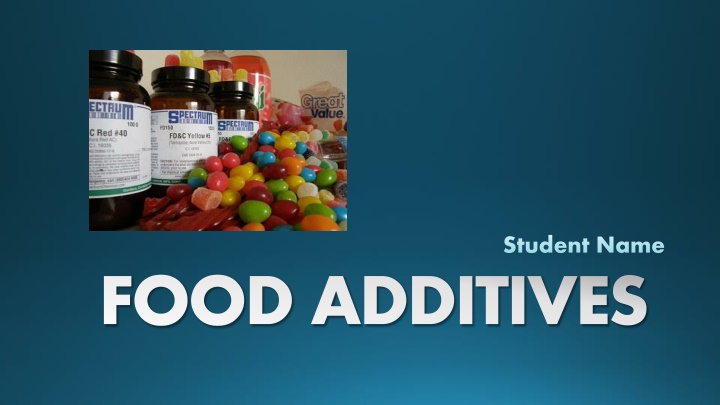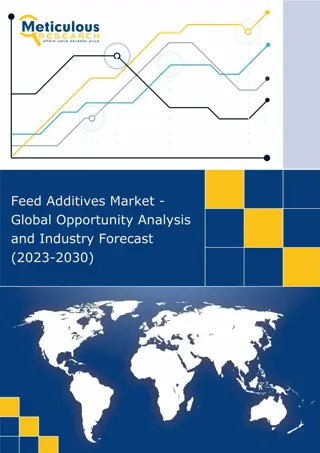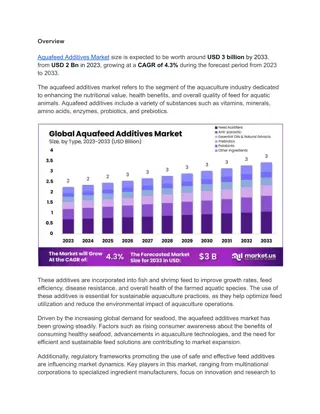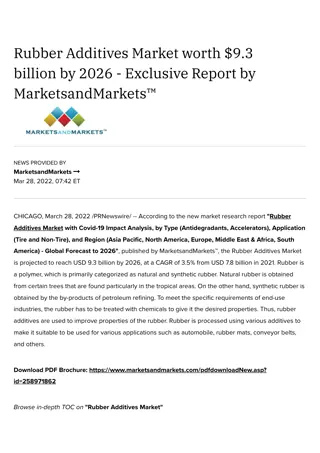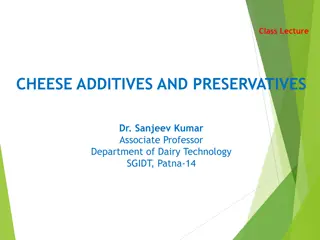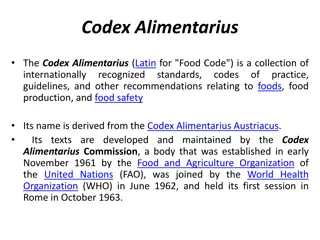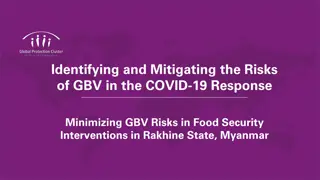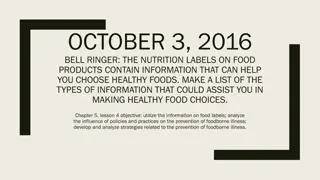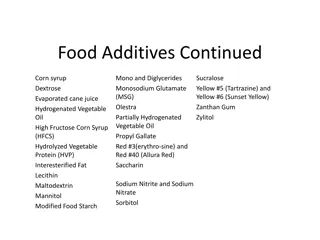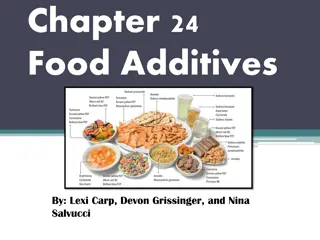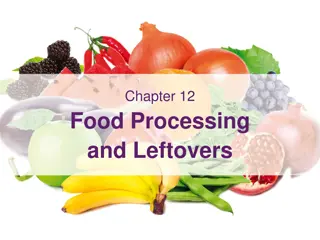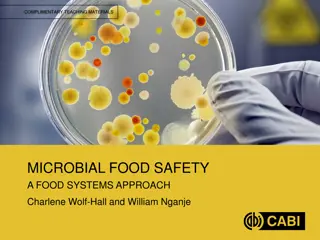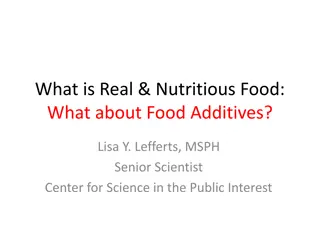The Risks of Food Additives: A Comprehensive Overview
Food additives play a significant role in enhancing and preserving food products, but they also come with potential health risks. This research project delves into the impact of food additives, highlighting concerning additives like brominated vegetable oil (BVO) and monosodium glutamate. The study sheds light on how some additives, despite being banned in certain countries, are still present in foods consumed worldwide. It emphasizes the importance of understanding and regulating food additives to safeguard consumer health.
Download Presentation

Please find below an Image/Link to download the presentation.
The content on the website is provided AS IS for your information and personal use only. It may not be sold, licensed, or shared on other websites without obtaining consent from the author.If you encounter any issues during the download, it is possible that the publisher has removed the file from their server.
You are allowed to download the files provided on this website for personal or commercial use, subject to the condition that they are used lawfully. All files are the property of their respective owners.
The content on the website is provided AS IS for your information and personal use only. It may not be sold, licensed, or shared on other websites without obtaining consent from the author.
E N D
Presentation Transcript
Student Name FOOD ADDITIVES
ESSENTIAL QUESTION How harmful are food additives?
Background A food additive is any substance added to a food, directly to improve its quality or indirectly via packaging. Food additives have been used for over a century to preserve, flavor, thicken, and enhance food. The Food and Drug Administration (FDA) is responsible for regulating food additives. The FDA closely regulates food additives with the exception of additives determined safe before 1958 and GRAS (generally recognized as safe) ingredients (Overview of Food).
Brominated vegetable oil, or BVO, acts as an emulsifier in soda and sports drinks, preventing the flavoring from separating and floating to the surface. The ingredient is banned in more than 100 countries because it contains bromine, a chemical whose vapors can be corrosive or toxic (Kim). " BVO is banned in many other countries because it has been shown to accumulate in human bodies over a prolonged period of time. In studies this accumulation has led to reduced fertility, early onset puberty, altered thyroid hormones, and impaired neurological development (Israel).
As a result of the scandal, European governments started rethinking their food regulation practices (Singh). This 2013 scandal would be known in England as horsegate. Adding horse meat to food is a quick way to cut corners in a discreet way. Although horsemeat is not a harmful additive, this wide-reaching scandal identifies a broad lack of regulations and safety.
Monosodium glutamate: Flavor enhancer known to cause seizures, chest pains, headache, nausea, burning sensations, and tightness of face (James). Harmful chemical food additives like Monosodium glutamate are proven dangerous to consumer health but are still put in foods and currently not banned. Monosodium glutamate isn t the only harmful chemical commonly used in food products, there are many others. Most people do not know about them because they are kept secret and the dangerous effects might not be visible over a short period of time. The problem with these harmful chemicals is that most consumers prefer taste over safety and quality.
CONCLUSION Throughout this research project I have learned about the harms of food additives in the United States of America and even around the world. Some food additives have been proven safe and beneficial, but most have been proven to be dangerous and can affect physical and mental growth. Food additives often fly under the radar and become unnoticed by the consumer because they do not show immediate effects. Sadly, this is a problem because additives can cause long term effects amongst people and the problems arise when it is too late to stop them since the food has already been consumed.
Works Cited Israel, Brett. Brominated battle: Soda chemical has cloudy health history . Environmental Health News. Environmental Health Sciences. 12 Dec. 2011. Web.4 September 2014. James, Jimmy. The Truth About Food Additives . Foododdity.com. The Daily Green. 26 June 2011. Web. 18 September 2014. Kim, Susannah. 11 Food Ingredients Banned Outside of the U.S. that We Eat. ABC News. ABC news Internet Ventures. 26 June 2013. Web. 22 September 2014. Overview of Food Ingredients, Additives, & Colors . FDA.org. U.S. Food and Drug Administration. April 2014. Web. 12 September 2014. Shayesteh, A. Dr.Shayesteh: Food additives and health risks . 27 First News. WKBN. WKBN staff. 8 September 2014. Singh, Maanvi. Scientists Step Up Food Fraud Efforts Following Horse Meat Scandal. NPR.org. 2014 NPR. 24 September 2014. Radio. 2 October 2014
